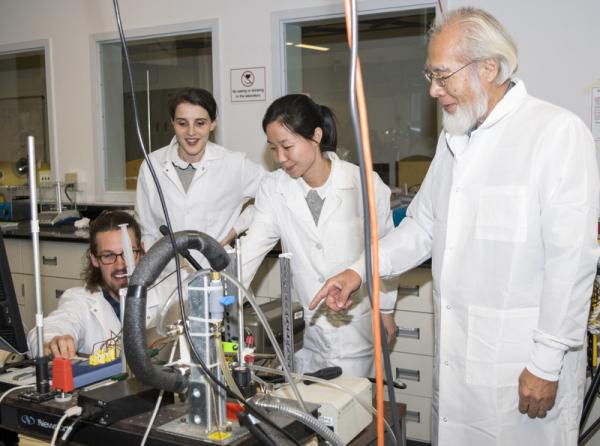
PIRE Project leader Masahiro Kawaji [right] with CCNY Grove School of Engineering PhD students [from left] Artur Zych, Fanny Thomas and Fang Liu.
A five-year research project on complex fluids with potential for transformative scientific discoveries in industries from petro-chemical to cosmetics is underway at The City College of New York’s Grove School of Engineering. Funded by a $5.2 million National Science Foundation grant, the initiative includes 11 partner institutions in France, Germany and Norway.
Possible outcomes of the research include:
- Lubricants that enable more efficient undersea drilling of oil and gas;
- Improved processes for freezing and solidifying gas for the refrigeration industry;
- More efficient manufacturing processes for cosmetics.
Leading the hi-tech research, under the aegis of the NSF’s Partnerships for International Research and Education (PIRE) program, is Masahiro Kawaji, acting director of the CCNY-based CUNY Energy Institute.
CCNY’s European partners are, in Germany:
- Karlsruhe Institute of Technology;
- Universität Hamburg;
- Ruhr-Universität Bochum/Fraunhofer UMSICHT;
- Fraunhofer ISE;
- Leibniz Institut Dresden.
In France:
- The National Polytechnic Institute of Toulouse;
- The National Research Institute of Science and Technology for Environment and Agriculture;
- École Nationale Supérieure (ENSTA ParisTech);
- Laboratoire de Chimie et Physique Quantiques.
And in Norway:
- The Norwegian Foundation for Scientific & Industrial Research;
- The Norwegian University of Science and Technology; and
- The University of Oslo.
In addition to engaging top scientists and engineers from these institutions in what Kawaji terms “advancing knowledge and making transformative scientific discoveries that could result in far reaching innovations, in both experimental and modeling methods,” the PIRE Project is also a boon for scores of students on both shores.
At CCNY, up to 30 students are involved hands-on in this invaluable opportunity for international collaborative research at the highest level. The tally includes seven PhD candidates, three postdoctoral fellows, 10 graduates and 10 undergraduates.
CCNY’s Louis Stokes Alliances for Minority Participation chapter will support two CUNY undergraduate scholars annually for summer research experiences at one of the aforementioned European partner institutions.
Other foreign research experience include attendance at annual review meetings in New York City, Norway, France and Germany, and a six-month internship for all seven PhD students at institutions in Europe.
Summing up the potential of the expansive project, whose NSF proposal name was “PIRE: Multi-scale, Multi-phase Phenomena in Complex Fluids for the Energy Industries,” Kawiji said: “It could lead to improvements in energy and process efficiency in industrial systems on a global scale.”
About The City College of New York
Since 1847, The City College of New York has provided a high quality and affordable education to generations of New Yorkers in a wide variety of disciplines. Today The Chronicle of Higher Education ranks CCNY #2 among public colleges with the greatest success in ensuring the social mobility of our student body; at the same time the Center for world University Rankings places it in the top 1.2% of universities worldwide in terms of academic excellence. More than 16,000 students pursue undergraduate and graduate degrees in eight professional schools and divisions, driven by significant funded research, creativity and scholarship. CCNY is as diverse, dynamic and visionary as New York City itself. View CCNY Media Kit.